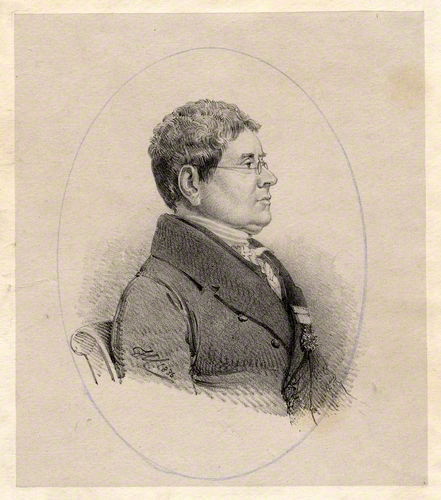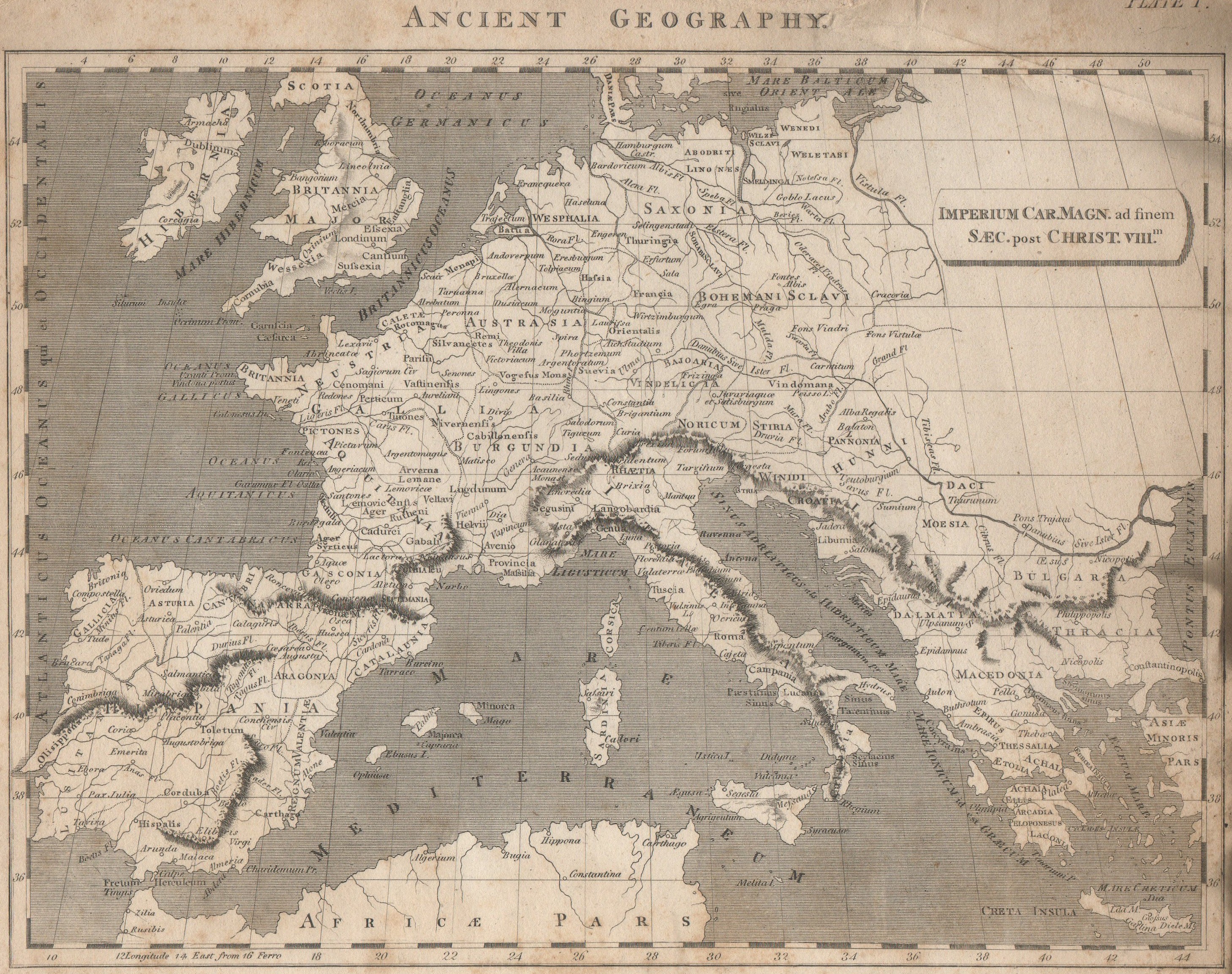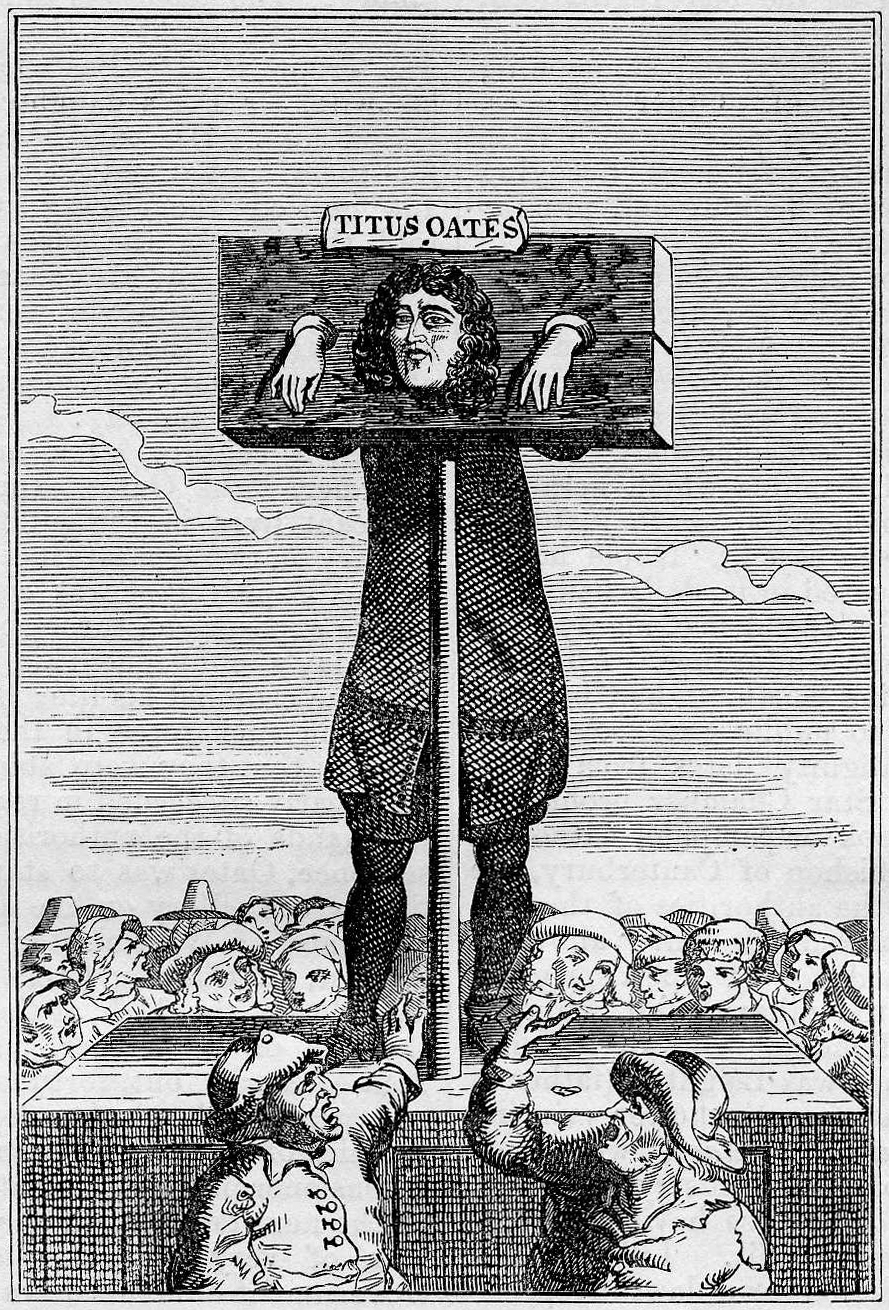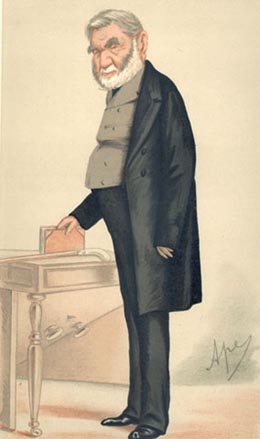|
Henry Ellis (librarian)
Sir Henry Ellis (29 November 177715 January 1869) was an English librarian and antiquarian, for a long period principal librarian at the British Museum. Early years Born in London, Henry Ellis was educated at the Mercers' School, and at Merchant Taylors' School, where his brother, the Rev. John Joseph Ellis, was assistant-master for forty years. Having gained one of the Merchant Taylors' exhibitions at St John's College, Oxford, he matriculated in 1796. Librarian In 1798, through his friend John Price, Ellis was appointed one of the two assistants in the Bodleian Library, the other being his future colleague in the British Museum Henry Hervey Baber. He took the degree of B.C.L. in 1802. He was a Fellow of St John's till 1805. In 1800 he was appointed a temporary assistant in the library of the British Museum, and in 1805 he became assistant-keeper of printed books under William Beloe. The theft of prints which cost Beloe his appointment in the following year raised Ellis to ... [...More Info...] [...Related Items...] OR: [Wikipedia] [Google] [Baidu] |
Henry Ellis
Henry Ellis may refer to: * Henry Augustus Ellis (1861–1939), Irish Australian physician and federalist * Henry Ellis (diplomat) (1788–1855), British diplomat * Henry Ellis (governor) (1721–1806), explorer, author, and second colonial Governor of Georgia * Henry Ellis (librarian) (1777–1869), English librarian * Henry Ellis, 2nd Viscount Clifden (1761–1836), Irish politician * Henry Bramley Ellis (1841–1910), English organist, composer, conductor and teacher * Henry Havelock Ellis (1859–1939), English physician, eugenicist, writer, progressive intellectual and social reformer * Henry Walton Ellis (1782–1815), British soldier See also * Henry Agar-Ellis, 3rd Viscount Clifden Henry Agar-Ellis, 3rd Viscount Clifden (25 February 1825 – 20 February 1866), styled the Lord Dover from 1833 to 1836, was an Irish courtier and race horse owner. Viscount Clifden was the eldest son of George Agar-Ellis, 1st Baron Dover, and his ... (1825–1866), Irish courtier and race ... [...More Info...] [...Related Items...] OR: [Wikipedia] [Google] [Baidu] |
Knight Of Hanover
The Royal Guelphic Order (german: Königliche Guelphen-Orden), sometimes referred to as the Hanoverian Guelphic Order, is a Hanoverian order of chivalry instituted on 28 April 1815 by the Prince Regent (later King George IV). It takes its name from the House of Guelph, of which the Hanoverians were a branch. Since Hanover and the United Kingdom shared a monarch until 1837, the order was frequently bestowed upon British subjects. History Until 1837 the order was frequently awarded to officers in the British Navy and Army, although it was still classed as a foreign order, with British members of the order not entitled to style themselves as "Sir" unless they were also created Knights Bachelor, as many were. The British link ended in 1837 when Hanover's royal union with Great Britain ended, with Ernest Augustus becoming King of Hanover and Queen Victoria ascending the British throne. When Hanover was annexed by the Kingdom of Prussia in 1866, the order continued as a house orde ... [...More Info...] [...Related Items...] OR: [Wikipedia] [Google] [Baidu] |
Rees's Cyclopædia
Rees's ''Cyclopædia'', in full ''The Cyclopædia; or, Universal Dictionary of Arts, Sciences, and Literature'' was an important 19th-century British encyclopaedia edited by Rev. Abraham Rees (1743–1825), a Presbyterian minister and scholar who had edited previous editions of '' Chambers's Cyclopædia''. Background When Rees was planning his ''Cyclopædia'', Europe was in the aftermath of the French Revolution, and during serialised publication (1802–1820) the Napoleonic Wars and War of 1812 occurred. Britain absorbed into its empire a number of the former French and Dutch colonies around the world; Romanticism came to the fore; evangelical Christianity flourished with the efforts of William Wilberforce; and factory manufacture burgeoned. With this background, philosophical radicalism was suspect in Britain, and aspects of the ''Cyclopædia'' were thought to be distinctly subversive and attracted the hostility of the Loyalist press. Contributors Jeremiah Joyce and Charl ... [...More Info...] [...Related Items...] OR: [Wikipedia] [Google] [Baidu] |
Henry Bourne
Henry Bourne (c.1694 – 16 February 1733) was an English historian, who is remembered for his ''Antiquitates Vulgares'' (1725), a pioneering work in the field of folklore studies, and for his substantial history of his home town of Newcastle upon Tyne (1736). Bourne was born in Newcastle, the son of Thomas Bourne, a tailor, in about 1694: he was baptised on 16 December 1694. His father originally had him apprenticed as a glazier; but he showed such promise that he was sent to the Royal Free Grammar School in Newcastle, where he flourished, eventually winning a scholarship to Cambridge Cambridge ( ) is a College town, university city and the county town in Cambridgeshire, England. It is located on the River Cam approximately north of London. As of the 2021 United Kingdom census, the population of Cambridge was 145,700. Cam ... under the tutelage of The Reverend Mr. Thomas Atherton, a fellow Novocastrian. He was appointed curate at All Hallows Church in Newcastle in 1 ... [...More Info...] [...Related Items...] OR: [Wikipedia] [Google] [Baidu] |
John Brand (antiquarian)
John Brand (19 August 1744 – 11 September 1806) was an English antiquarian and Church of England clergyman. He was author of ''Observations on Popular Antiquities: including the whole of Mr Bourne's “Antiquitates Vulgares,” with addenda to every chapter of that work.'' Life Born in Washington, County Durham, he was educated at the Royal Grammar School and Lincoln College, Oxford. Initially apprenticed as a cordwainer, he obtained a degree from Lincoln College, Oxford, in 1775 and was appointed perpetual curate of Cramlington. Brand was appointed Secretary to the Society of Antiquaries of London in 1784 and was annually re-elected until his death. He was buried in the nearby churchyard of St Mary-at-Hill. When this churchyard was cleared, his remains were moved to West Norwood Cemetery within the enclosure that the church acquired there in 1847. Works Brand wrote ''Observations on the popular antiquities of Great Britain: Including the Whole of Mr. Bourne's Antiquitat ... [...More Info...] [...Related Items...] OR: [Wikipedia] [Google] [Baidu] |
Archaeologia (London)
Archaeologia or Archæologia may refer to: *''Archaeologia Cambrensis ''Archaeologia Cambrensis'' is a Welsh archaeological and historical scholarly journal published annually by the Cambrian Archaeological Association. It contains historical essays, excavation reports, and book reviews, as well as society not ...'', an archaeological and historical scholarly journal, published annually in Wales by the Cambrian Archaeological Association, containing excavation reports, book reviews, and historical essays. It also includes society notes and accounts of field visits *'' Archaeologia Cantiana'', an annual journal published by the Kent Archaeological Society on the archaeology and history of Kent * ''Archaeologia'' (London), an international journal published by the Society of Antiquaries of London *'' Archaeologia Scotica: Transactions of the Society of Antiquaries of Scotland'' *'' Archaeologia Polona'', a journal published in English annually since 1958 by the Institute of ... [...More Info...] [...Related Items...] OR: [Wikipedia] [Google] [Baidu] |
The Pillory
The pillory is a device made of a wooden or metal framework erected on a post, with holes for securing the head and hands, formerly used for punishment by public humiliation and often further physical abuse. The pillory is related to the stocks. Etymology The word is documented in English since 1274 (attested in Anglo-Latin from ), and stems from Old French (1168; modern French , see below), itself from medieval Latin , of uncertain origin, perhaps a diminutive of Latin 'pillar, stone barrier'. Description Rather like the lesser punishment called the stocks, the pillory consisted of hinged wooden boards forming holes through which the head and/or various limbs were inserted; then the boards were locked together to secure the captive. Pillories were set up to hold people in marketplaces, crossroads, and other public places. They were often placed on platforms to increase public visibility of the person. Often a placard detailing the crime was placed nearby; these punishm ... [...More Info...] [...Related Items...] OR: [Wikipedia] [Google] [Baidu] |
Bedford Square
Bedford Square is a garden square in the Bloomsbury district of the Borough of Camden in London, England. History Built between 1775 and 1783 as an upper middle class residential area, the square has had many distinguished residents, including Lord Eldon, one of Britain's longest serving and most celebrated Lord Chancellors, who lived in the largest house in the square for many years. The square takes its name from the main title of the Russell family, the Dukes of Bedford, who owned much of the land in what is now Bloomsbury. The architect Thomas Leverton is known to have designed some of the houses, although he may not have been responsible for all of them. The building agreements for Bedford Square were signed by the trustees of the late Duke of Bedford and William Scott and Robert Grews, the builders, in 1776. The first leases, for the entire west side (Nos. 28–39), were granted in November 1776. It seems unlikely that these dozen houses were built within 11 months ... [...More Info...] [...Related Items...] OR: [Wikipedia] [Google] [Baidu] |
John Yonge Akerman
John Yonge Akerman (1806–1873) was an English antiquarian specializing mainly in numismatics. He also wrote under the pseudonym Paul Pindar. Life Akerman was born in London on 12 June 1806. In early life he became secretary to William Cobbett; in 1838 to the London and Greenwich Railway Company; and later to Lord Albert Conyngham (afterwards Lord Londesborough). In January 1834, Akerman was elected a fellow of the Society of Antiquaries. In the autumn of 1848 he became joint secretary with Sir Henry Ellis, and five years later, sole secretary. He held the post until 1860, when poor health compelled him to resign it and the editorship of the ''Archæologia''. In 1836, at a time when there was no English periodical of the kind, he started, chiefly at his own expense, a publication called the ''Numismatic Journal'', two volumes of which appeared under his editorship. He helped to form the Numismatic Society of London, which held its first regular meeting in December 1836. Ak ... [...More Info...] [...Related Items...] OR: [Wikipedia] [Google] [Baidu] |
Anthony Panizzi
Sir Antonio Genesio Maria Panizzi (16 September 1797 – 8 April 1879), better known as Anthony Panizzi, was a naturalised British citizen of Italian birth, and an Italian patriot. He was a librarian, becoming the Principal Librarian (i.e. head) of the British Museum from 1856 to 1866. Early life in Italy Panizzi was born at Brescello in the Duchy of Modena and Reggio (now the province of Reggio Emilia), Italy, on 16 September 1797. He studied at the Lyceum of Reggio, then obtained a degree in law from the University of Parma in 1818. He was appointed as Inspector of Public Schools at Brescello. It was during this time that a charge was brought against Panizzi that he was a Carbonaro, that is, a member of a secret society that opposed the political regime of that time. The evidence would suggest that the accusation was true. In October 1822, amid political upheaval in Italy, Panizzi was tipped off that he faced arrest and trial as a subversive. The risk was one faced by many ... [...More Info...] [...Related Items...] OR: [Wikipedia] [Google] [Baidu] |
Josiah Forshall
Josiah Forshall (29 March 1795 – 18 December 1863) was an English librarian. Life Forshall was born at Witney, Oxfordshire on 29 March 1795, the eldest son of Samuel Forshall. He received education at the grammar schools of Exeter and Chester, and in 1814 entered Exeter College, Oxford. He graduated B.A. in 1818, taking a first class in mathematics and a second in '' literae humaniores''. He became M.A. in 1821, and was elected fellow and tutor of his college. Forshall was appointed an assistant librarian in the manuscript department of the British Museum in 1824, and became keeper of that department in 1827. In 1828 he was elected a Fellow of the Royal Society. In 1828 Forshall was appointed secretary to the Museum, and in 1837 resigned his keepership in order to devote himself exclusively to his secretarial duties. He was examined before the select committee appointed to inquire into the Museum in 1835–6, and made revelations on the subject of patronage. As secretary he h ... [...More Info...] [...Related Items...] OR: [Wikipedia] [Google] [Baidu] |
Benjamin Hawes
Sir Benjamin Hawes (1797 – 15 May 1862) was a British Whig politician. Early life He was a grandson of William Hawes, founder of the Royal Humane Society, and son of Benjamin Hawes of New Barge House, Lambeth, who was a businessman and Fellow of the Society of Antiquaries of London; his mother was Ann Feltham, sister of John Feltham. He had a younger brother, who also was called William. There was another brother, Thomas, and a sister, Caroline who married John Donkin, and a second sister Sarah, married name Curtis. Barge House, where Hawes lived in the 1830s, was in the Christ Church area of Lambeth, at the corner of Commercial Road and Broad Wall. Hawes was educated at William Carmalt's school at Putney, and when of age in 1818 entered into partnership with his father and uncle, in the business of soap-boiling. He spent relatively little of his life in the industry, but was later known in parliament as "Hawes the Soap-Boiler". Hawes Soap Works The Hawes Soap Works stood ... [...More Info...] [...Related Items...] OR: [Wikipedia] [Google] [Baidu] |





